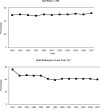The hardening hypothesis: is the ability to quit decreasing due to increasing nicotine dependence? A review and commentary
- PMID: 21411244
- PMCID: PMC3133840
- DOI: 10.1016/j.drugalcdep.2011.02.009
The hardening hypothesis: is the ability to quit decreasing due to increasing nicotine dependence? A review and commentary
Abstract
The "hardening hypothesis" states tobacco control activities have mostly influenced those smokers who found it easier to quit and, thus, remaining smokers are those who are less likely to stop smoking. This paper first describes a conceptual model for hardening. Then the paper describes important methodological distinctions (quit attempts vs. ability to remain abstinent as indicators, measures of hardening per se vs. measures of causes of hardening, and dependence measures that do vs. do not include cigarettes per day (cigs/day).) After this commentary, the paper reviews data from prior reviews and new searches for studies on one type of hardening: the decreasing ability to quit due to increasing nicotine dependence. Overall, all four studies of the general population of smokers found no evidence of decreased ability to quit; however, both secondary analyses of treatment-seeking smokers found quit rates were decreasing over time. Cigs/day and time-to-first cigarette measures of dependence did not increase over time; however, two studies found that DSM-defined dependence appeared to be increasing over time. Although these data suggest hardening may be occurring in treatment seekers but not in the general population of smokers, this conclusion may be premature given the small number of data sets and indirect measures of quit success and dependence in the data sets. Future studies should include questions about quit attempts, ability to abstain, treatment use, and multi-item dependence measures.
Copyright © 2011 Elsevier Ireland Ltd. All rights reserved.
Figures
Similar articles
-
An Update on Hardening: A Qualitative Review.Nicotine Tob Res. 2020 May 26;22(6):867-871. doi: 10.1093/ntr/ntz042. Nicotine Tob Res. 2020. PMID: 30868166 Review.
-
Prevalence of hardcore smoking in the Netherlands between 2001 and 2012: a test of the hardening hypothesis.BMC Public Health. 2016 Aug 9;16:754. doi: 10.1186/s12889-016-3434-x. BMC Public Health. 2016. PMID: 27506600 Free PMC article.
-
Increase of unmotivated and hardened smokers in Hong Kong: a repeated cross-sectional trend analysis.Tob Control. 2024 Jun 20;33(4):481-488. doi: 10.1136/tc-2022-057724. Tob Control. 2024. PMID: 36878685
-
Use of E-Cigarettes Among Current Smokers: Associations Among Reasons for Use, Quit Intentions, and Current Tobacco Use.Nicotine Tob Res. 2015 Oct;17(10):1228-34. doi: 10.1093/ntr/ntv003. Epub 2015 Jan 14. Nicotine Tob Res. 2015. PMID: 25589678 Free PMC article.
-
Behavioral and Subjective Effects of Reducing Nicotine in Cigarettes: A Cessation Commentary.Nicotine Tob Res. 2019 Dec 23;21(Suppl 1):S19-S21. doi: 10.1093/ntr/ntz100. Nicotine Tob Res. 2019. PMID: 31867644 Free PMC article. Review.
Cited by
-
Impact of tobacco control policy on quitting and nicotine dependence among women in five European countries.Tob Control. 2014 Mar;23(2):173-7. doi: 10.1136/tobaccocontrol-2011-050391. Epub 2012 Nov 14. Tob Control. 2014. PMID: 23152098 Free PMC article.
-
Childhood maltreatment and the persistence of smoking: a longitudinal study among adults in the US.Child Abuse Negl. 2014 Dec;38(12):1995-2006. doi: 10.1016/j.chiabu.2014.10.022. Epub 2014 Nov 22. Child Abuse Negl. 2014. PMID: 25466425 Free PMC article.
-
Factors associated with abstinence after a recent smoking cessation attempt across 28 European Union member states.Tob Prev Cessat. 2020 Jan 25;7:5. doi: 10.18332/tpc/132123. eCollection 2021. Tob Prev Cessat. 2020. PMID: 33511319 Free PMC article.
-
Cohort Effects on Tobacco Consumption and Its Genetic and Environmental Variance Among Finnish Adults Born Between 1880 and 1957.Nicotine Tob Res. 2024 Nov 22;26(12):1607-1615. doi: 10.1093/ntr/ntae091. Nicotine Tob Res. 2024. PMID: 38630445 Free PMC article.
-
Characteristics of Hardcore Male Smokers in Taiwan: A Qualitative Study.Asian Pac Isl Nurs J. 2020;5(2):55-62. doi: 10.31372/20200502.1085. Asian Pac Isl Nurs J. 2020. PMID: 33043134 Free PMC article.
References
-
- Breslau N, Johnson EO, Hiripi E, Kessler R. Nicotine dependence in the United States: prevalence, trends and smoking persistence. Arch. Gen. Psychiatr. 2001;58:810–816. - PubMed
-
- Burns DM, Major JM, Anderson CM, Vaughn JW. Those Who Continue To Smoke: Is Achieving Abstinence Harder and Do We Need to Change Our Interventions? Smoking and Tobacco Control Monograph No. 15. U.S. Department of Health and Human Services, Public Health Service, National Institutes of Health, National Cancer Institute; Bethesda: 2003. Changes in cross-sectional measures of cessation, numbers of cigarettes smoked per day, and time to first cigarette-California and national data. pp. 101–125.
-
- Celebucki C, Brawarsky P. Those Who Continue to Smoke: Is Achieving Abstinence Harder and Do We Need to Change our Interventions? U.S. Department of Health and Human Services, Public Health Service, National Institutes of Health, National Cancer Institute; Bethesda: 2003. Hardening of the target: Evidence from Massachusetts. pp. 127–145.
Publication types
MeSH terms
Grants and funding
LinkOut - more resources
Full Text Sources
Other Literature Sources
Medical



